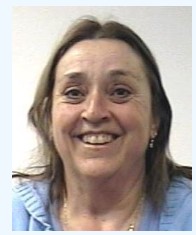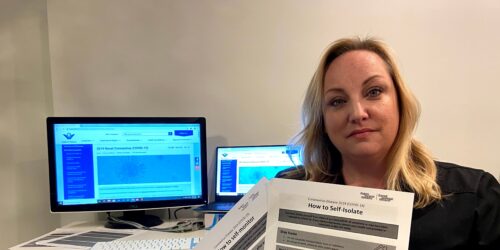Creating a Harmonized Assessment Tool for Capstone Projects
Capstone projects showcase students’ comprehensive learning. Conestoga’s Computer Science programs host a capstone project at the end of each semester – an opportunity for students to share the mobile apps, websites and automated project management systems they have produced for local businesses. Read on to review their process and feel free to share your own capstone experiences in the faculty community on Teams.
On Aug. 17, 2022, students in Mobile Solutions Development and Computer Applications Development demonstrated e-learning apps, e-commerce sites, inventory tracking systems, a job portal, a content management system, and an investment management system for their assigned clients, employing the skills they learned in their respective programs.
Because students in various Computer Science programs participate in the capstone project, professors Liz Stacey, Randall Kozak and Davneet Chawla created a harmonized rubric so faculty can evaluate each phase of students’ project planning and presentation consistently.
Creating Consistency with Learning Assessment Tools
“In the past, we divided the capstone project into separate assignments and graded students’ progress in chunks,” said Liz, who introduces the capstone project to students. “Our new rubric is similar; only, we now use a spreadsheet that combines every part of the capstone project in one location. We chose this format rather than eConestoga rubrics because it’s easier for faculty to monitor progress and for students to see what work they should do.”
Below you can see how the spreadsheet guides the student over the course of the project and allows faculty to evaluate different levels of achievement.

Students submit work for the capstone project in regular phases, following industry best practices with project planning and management. In this rubric, students know to produce weekly team meeting minutes and individual status reports, and then present project updates for their mentors to review.
After each phase, students are asked to report on their progress. Mentors evaluate the students on the feasibility of their planned capstone project, provide feedback on the work done by students, and suggest enhancements to the planning and presentation.
Combining Course Learning Outcomes into a Capstone Project
“As students work on projects for their clients, the mentors guide them and discuss updates weekly,” said Davneet. “The capstone project combines everything students have learned in their programs. They’ll practice designing and creating mobile applications, websites, and databases to use their skills as programmers.”
The capstone project demonstrates the Computer Science programs’ learning outcomes and includes elements learned in College Reading and Writing Skills (COMM1085) and presentation skills. In some programs, students take a project development course to build their project management skills in time for the event.
“Whether students are taking a Computer Science diploma or a post-graduate certificate, the capstone project is identical across all programs,” said Randall, co-ordinator of the Computer Applications Development and IT Innovation and Design programs. “Students will start their capstone project with different levels of preparedness, so we work together as a faculty team to encourage students to contribute the same quality and amount of work to their projects.
Liz, Randall and Davneet’s advice for faculty is to each contribute at least one individual learning assessment when collaborating on the same course or capstone. This way, faculty create uniformity among their team and their teaching materials. “I call it the buy-in process,” said Liz. “Faculty have a chance to contribute their subject matter expertise to the program and share ideas with their colleagues. It’s a valuable experience for them and students alike.”
Liz Stacey has taught at Conestoga full-time since 1999, and for a number of years as a part-time/sessional professor. She has worked as a computer programmer and team lead for a number of companies and owned an incorporated company called “LMS Computers” with 15 employees. Liz teaches, mainly, in Conestoga’s Computer Science diploma programs (CPA.CP.ITID) and acts as a guidance lead for several courses in the School of Applied Computer Science and Information Technology.

Randall Kozak has been with Conestoga for 21 years, teaching in the Computer Programming (CP), Computer Programming & Analysis (CPA) and IT Innovation and Design (ITID) programs. He has taught courses in programming, database, cybersecurity, system analysis, IT management and UX/UI design, and contributed to the development of the Health Informatics Management degree program (now BAHIS), the IT Innovation and Design (ITID) advanced diploma, the Computer Application Security (CAS) graduate certificate and Digital Solutions Management (DSM) graduate certificate programs.

Holding an M. Tech and B. Tech in Computer Science and Engineering, along with 10 years of experience in software, web design, and development, Davneet Chawla is a full-time professor and program co-ordinator of Conestoga’s Mobile Solutions Development program. In Davneet’s four years at Conestoga, he has taught in the Computer Programming, Computer Programming and Analysis, IT Innovation and Design, Computer Applications Development, Software Quality Assurance and Test Engineering programs.




